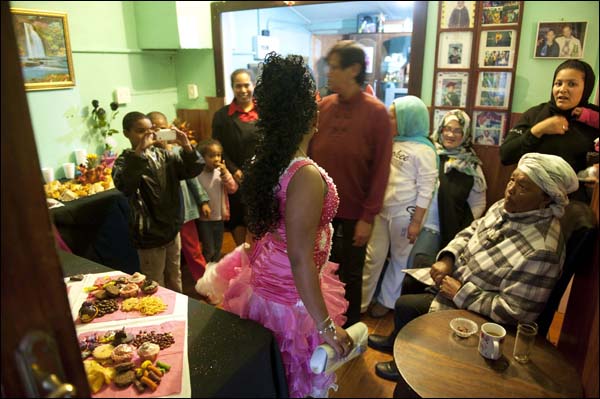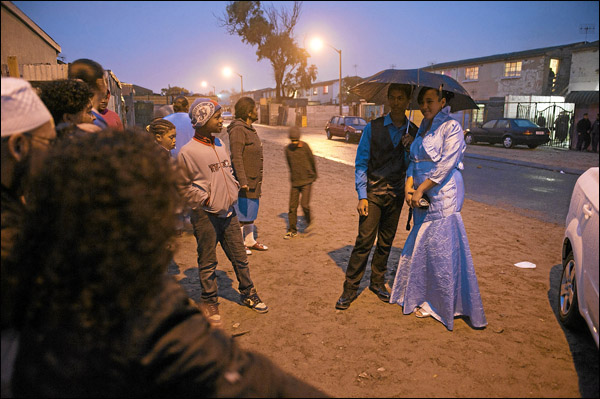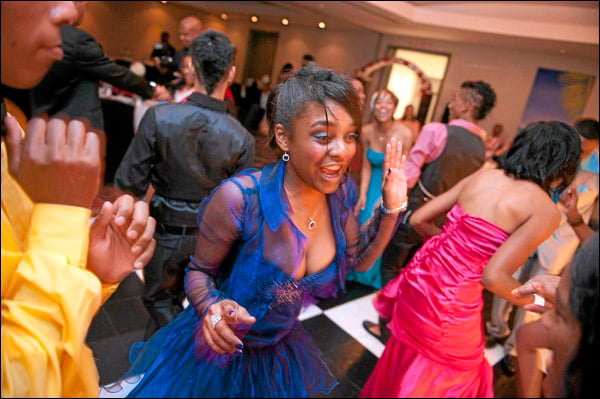Natasha Wilkinson. (David Harrison, M&G)
Masieja Norton says there's a "model" staying in the house "down there" who's someone's date for the Silver Stream Secondary School matric dance tonight.
Then there's the "black beauty" living up the stairs there who's also going, and the "top of the class" who lives across the road "over there".
Because of the matric dance, the residents of Thames Walk in Manenberg in the Western Cape won't have to eat bread and garlic tonight, Norton says.
"Tomorrow we'll eat bread and garlic again but it doesn't matter. As long as everyone has a good time tonight."
The middle-aged woman tightens her dressing gown around her waist, adjusts her headscarf and claps once.
Norton likes an audience and she's got one now. They laugh-shout with every sentence. She's telling the gathering standing in the wind outside her house how every year on the night of the matric dance the families of the pupils "get a table" for the before party.
On it will be treats such as milk tart, lemon meringue pie, boeber (a spiced milk drink) and a cake that says "Matric 2013". The neighbours will invite themselves to the party, congratulate the pupil and his or her date on making it this far in school, and move on to the next house.
Three households with tables is a good year, by the sounds of things.
Gang-related deaths
Everyone will run towards the fancy cars that are owned by connections of connections who are being nice by driving the pupils to the dance.
"'Polla' cars. It's a gay word for 'stunning'," Norton says.
People are sitting outside their houses in the sun watching what everyone else is doing and there is no shortage of commentary. It's an everyday scene, Norton says.
It may be an everyday scene now but next week the gang violence might erupt again with shootings that send bullets into the houses we're looking at right now, sometimes hitting unintended, innocent targets.
It might get so bad again that schools close like they did in August for fear of bullets penetrating a classroom wall and hitting a pupil.
There have already been 27 gang-related deaths since May and more than 50 people have been injured, the leader of the Church of Reconciliation, Donovan Meyer, says. He has a long history of trying to facilitate truces between gangs and there's a ceasefire right now.

The Wilkinson house is filled with family, friends and food as the community gathers to watch teenager Natasha and her date make their way to her matric dance in Bantry Bay.
Some say there's a good chance things will get bad again in this community of about 100 000 people, especially since Hard Livings gang leader Rashied Staggie was released from prison last month on day parole.
If things do get bad again the newspapers will run their gang violence headlines and there will probably be more features about the real reason of gang violence on the Cape Flats, and what the real solution is.
Apartheid legacy
So far, the consensus is that apartheid-legacy socioeconomic problems are the root cause of gangsterism and, until the government addresses these and there is buy-in from churches and community members in the form of social upliftment programmes, skills development and activity centres, the violence won't be going away anytime soon.
But as long as there is gang violence newspapers will continue to report on it, because the lasting effects are dark and real. They can be seen in the scars on the men's faces and in the way children play.
Valdi van Reenen-Le Roux, director of the Trauma Centre for Survivors of Violence and Torture, has seen hundreds of Manenberg children between the ages of five and 10 come through the centre's counselling programme.
"What would you expect children this age to do with crayons and paper?" she says.
"The other week they carved bullets out of the crayons.
"We ask their parents which TV characters they identify with and the parents say 'none'. They say you can ask the children about guns and they'll say 'that's a beretta', and they'll be able to say what type of bullet that is. They play out shootings."
And what they've seen is too much.
Dead body
Natasha Wilkinson is in matric at Silver Stream Secondary School. Two weeks ago she and her family woke up to a body lying in the road outside their gate.
"Sometimes we hear the shooting at night," she tells me, sitting in her bedroom next to the kitchen, "but we didn't hear the shots with this one. I don't know if that's just because we're used to it now or if they used one of those quiet guns."
But tonight is the night of the matric dance and people are getting ready for a party. It's a good thing. It's one of the many things about Manenberg that community members made sure to tell me about.
Norton is tired of journalists writing about "Staggie, Staggie, Staggie".
"It's as if people think that's all we've got here. If I go for a job interview I have to lie about living in Manenberg because they'll think I'm involved in a gang."
There's more lightness in this community than the newspaper headlines make everyone believe, she says.

Jermaine Sepkitt and his date pose outside his parents’ house before leaving for Bantry Bay.
"Has there been any shooting while you've been standing here? No. There is gang violence but most of the time we just get on with our lives."
Natasha's mother, Theresa Williams, says she wouldn't want to live anywhere else.
"It's like a family here. It's not a bad place; it just has bad elements."
Pass rate
Van Reenen-Le Roux says community members want people to know about the good things too.
"They have role models, lights of the community, and they want people to know this."
Shereen Daniels, the English teacher who organised the matric dance, is one of those lights. She grew up in Manenberg and matriculated from Silver Stream in 1986.
She left a 10-year job in retail to go back to university to become a teacher so she could go back to her school to work there.
"I was offered posts at other, 'safer' schools, but I knew that if I came back to Silver Stream I could help so much."
It's a long haul for the school that last year ranked lowest in the province with a 34% pass rate, many dropouts and teacher vacancies, and of course the gang violence that shut its doors for six weeks this year.
Daniels doesn't know how many children will pass this year nor, out of those, how many will continue their education. But they've got this far and every child deserves a matric dance, she says.
"It's a celebration of getting through 12 years at school. It's a sign of hope."
Getting dark
Back in Thames Walk we stand with Jermaine Sepkitt, another pupil going to the dance, and his mother in their small lounge.
It's only 1pm but Jermaine tells us he's already bathed. He bounces on his toes as he tells us how slowly the hours are ticking by until he needs to fetch his date.
Later outside, with the neighbour's children clinging to my jeans, Jermaine's mother shows me his portfolio of his animation drawings. He wants to study graphic design. There isn't a plan yet for how he will do this and he needs a bursary, "but they're working on it", his mother says.
Down the road, the preparations at the Wilkinson household are in full swing. The kitchen is filled with aunties and cousins in aprons talking about who will be marrying whom this year. Steam from the frying frikkadels comes into the room where Natasha is getting her hair done.
Her two younger brothers sit on her bed watching the go-to man in the community for beauty treatments put aqueous cream in her long, dark hair. They hustle each other to sit as far away as possible from the hair extensions on the duvet next to them.
In the kitchen, piles of food fill the counters. Music plays in the background. A relative pops in with more meat.
"Just in and out," she says.
A baby slips on the tiles, is scooped up and offered a hairbrush to play with as a distraction from his tears.

Manenberg matrics enjoy themselves at a swanky hotel in Bantry Bay Hotel.
Four hours later we're back at Thames Walk. It's wet and cold from the rain and it's getting dark.
But light and music spill from the open doors on to the street and I'm surrounded by the whistles and whoops that come with a night that has been anticipated for a long time.
Smile for the cameras
People run from house to house making sure they compliment the mother with appropriate enthusiasm on how smart her son or daughter is, before helping themselves to the egg-mayonnaise sandwiches.
Norton is there telling me I'm "bad" for coming so late because I missed the Mustang that came to fetch one of the pupils.
Jermaine has picked up his date and is swept into the wave of people so he and his partner can stand behind the table and have their photos taken.
I get caught in the tide and then I'm inside and I can't move because it's so packed with people.
"It's like an oven in here," someone says.
Arms with camera phones flashing reach over my head.
"Show us your teeth, baby," someone shouts at the couple.
A teenager pops up next to the couple and smiles for the cameras. Someone pulls him away.
"Is it your matric dance?" he says and the room packs up with laughter.
Crowds
It's time to leave but the BMW to take Jermaine and his date to the dance hasn't arrived. His mother asks if I will take them.
The couple can barely reach the Renault for the crowds standing around them waiting to watch the big departure.
We drive off. But we're not even 100m down the road before three people are chasing after us.
"Hulle's Beemer is here, hulle's Beemer is here! [Their Beemer is here]" they shout. I turn the Renault around and drop the couple off at their "Polla" BMW.
It's 8pm and the conference room at the swanky Protea Hotel in Bantry Bay is popping with the sequins, glitter and diamantés on the dresses.
The music is so loud you can barely talk over it, but one of the pupils manages to shout to me that he's never eaten food like this before.
Time to dance
There are lots of photos, hugging, kissing and more photos, and before the dancing starts there must be speeches.
A pupil takes the microphone and welcomes his peers. "Even on the rainy days with the shooting and stuff we still were learning," he says to clapping.
"Let's keep that energy up and when we meet again let's have a good story to tell," he says.
But they only have until 11pm before the hotel closes its conference rooms, so now it's time to dance.